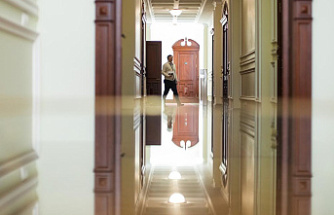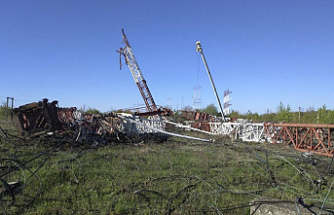This shrine, dedicated to Ram, is being built on the site where once stood a 16th century mosque. It was destroyed by a Hindu mob in 1992.
It's just one of many frenetic constructions, including massive roads, hotels, and a swanky railway station, that are underway in Ayodhya. This holy city is located in Uttar Pradesh, northern India, where Prime Minister Narendra Modi's Bharatiya Janata Party seeks reelection. They tout Hindu-first politics, economic prosperity, and Hindu-first politics.
Manish Yadav (a 25-year old student) saw this first sign of progress in the once-sleepy town.
Modi's BJP won twice emphatically on the national stage. The state elections in Uttar Pradesh, India's largest with more than 230 million inhabitants, are critical. They provide a gauge of the party's popularity in the lead up to general elections in 2024. The state will see over 150 million voters in seven phases that begin Thursday and end in March. The BJP will fight for power in four other states, including March and February.
Ayodhya is a must-have for success. Yadav stated that we need companies to invest here, and need technical colleges, factories, and jobs so people don’t leave. Yadav stated that he voted in the BJP for 2019 because it promised the construction of the temple. "Now we need more."
Uttar Pradesh is currently governed BJP's Yogi Adipyanath, a polarizing Hindu monk who became a politician. Yadav claimed that the government has failed him and millions of others like him to get jobs. He will still vote for them.
Infrastructure seems to be the BJP's solution, with mammoth expressways as well as airports to increase connectivity and tourism. Analysts are skeptical that huge public expenditures on such projects will be enough to stimulate growth in Uttar Pradesh. Uttar Pradesh is a poor state and is experiencing rising unemployment.
According to economist Santosh Mehrotra who analysed national labor data, Adityanath's youth unemployment increased fivefold.
However, the BJP has made many grand promises. The BJP promises to attract investment, provide electricity free of charge to farmers, and create jobs for 20,000,000 people, but it has not provided any details.
It also appeals to voters by offering welfare measures such as doubling the amount of food for the poor and tough stances on crime.
The party's core Hindu nationalist agenda cannot be ignored. After inaugurating a $45million corridor connecting two of the most important religious sites in the state, Modi took an ice-cold dip in Ganges River in December. Analysts say such events have made temple inaugurations political spectacles, which distract from more pressing issues.
Mehrohtra stated that there is a limit on how much employment and growth you can create around temples.
The big-ticket projects are a mix of religion and infrastructure that aim to please the BJP's Hindu base, amid discontent from key voters. Last time, the party won the state by consolidating Hindu votes across all castes. Multiple defections to Samajwadi Party's secular appeal, which has won over voters from many castes and the Muslim community, have created uncertainty.
Farmers are an important voting bloc and still furious at Modi's push for agriculture laws. This triggered a year-long protest, before Modi gave in to the pressure and revoked them last November. After a calamitous increase in infections last year, many bodies were found floating in the Ganges, the BJP is now facing COVID-19 management mismanagement allegations.
The polls will be a referendum on Adityanath (a saffron-robed figure of the Hindu right-wing) who, according to some analysts, is trying to become the next prime minister. After the BJP's victory in 2017, he was elected the chief minister, the highest state official.
"It's an electoral test on him brand as a leader, because he incarnates a radical form of Hindu nationalism & is overly communal than other BJP members," stated Gilles Verniers (a political science professor at Ashoka University).
Adityanath, the head of a prominent Hindu temple, has seen a rise in violence against Muslims. There have been numerous reports of lynchings and other attacks. Adityanath recently declared that the upcoming election would be a "80% against 20%" contest. This is roughly in line with Uttar Pradesh's Hindu- and Muslim population. In an interview with local media, Adityanath clarified the figures. He said that the majority wanted development and safety more than the minority who opposed it.
"The BJP has built toilets and houses for the poor without discriminating between caste or religion. Vijay Bahadur Pathak (BJP state vice president) stated that no one can claim that the government's benefits have been available to Muslims and Hindus.
Mohammed Noor, an auto-rickshaw driver from Lucknow, the capital of the state, understood the meaning. "Until the Yogi government arrived, nobody could distinguish a Hindu from an Islam here. He said that the BJP had created a sense of division, of difference, and this has only grown since their rise.
"The Muslim community has just given up, we have no hope, and we have stopped reacting," Shabbar Siddique (18 years old) said.
Even the construction in Ayodhya of the temple has drawn resentment from the Muslims.
"What can we do? "We'll have to follow it since the judgment has been handed down by the highest court," stated Syed Zia Haider Rizvi (owner of a watch shop). "As a businessman I should win."
In 2019, the Supreme Court ruled in favor for the temple. This ended one of India's longest land disputes and allowed alternative land to be used for a mosque. While many Hindus believe Ram was born on the site, a significant Muslim body regretted the decision.
In 1992, the mosque was destroyed. This triggered riots that saw 2,000 Indians killed in violence. Many Muslims in Uttar Pradesh feel a sense of increasing fear and anxiety, but Hindu and Muslim residents in Ayodhya say that there have not been any religious tensions since the unrest at the mosque.
The court verdict was interpreted by the BJP as a declaration of their success. It came shortly after the 2019 national elections. According to observers, Modi's electoral success was likely helped by the enthusiasm behind the ruling.
Analysts now believe that the party has squeezed every last drop of the temple.
Sharat Pradhan, a Lucknow-based political analyst, said that they are the best at keeping Hindu passions alive for decades and even decades. It has been outlived by electoral expectations.
BJP leaders have already invoked another holy city in Uttar Pradesh. Adityanath mentioned Mathura in December. Mathura is believed to be the birthplace for Krishna, a major Hindu god. Recent court proceedings by Hindu priests regarding a mosque built in 17th century could spark tensions.
Mathura, just like Ayodhya will also have a temple. Adityanath was quoted by local media as saying that work was already underway.
Verniers, a political science professor, said, "Now that they've won Ayodhya they will need another battle. Which site are they going next to fix their sights on?" "They will need to find another site once they have inaugurated the Ram temple."












